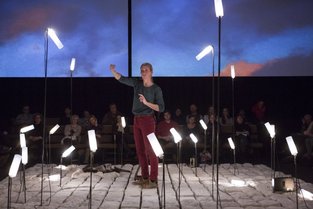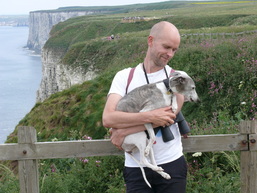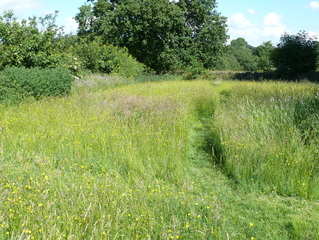A conversation with David Harradine
"I was never interested in doing the normal stuff about human-to-human relationships". David told me, "I am interested in people's relationships with other things, like nature, or the weather, or place." We had chosen our meeting-place well, then: the wild, windy, seabird cliffs near Bempton, in David's home county of Yorkshire.
 Laura Cubitt in Above Me The Wide Blue Sky photo: Matthew Andrews
Laura Cubitt in Above Me The Wide Blue Sky photo: Matthew Andrews
The event didn't stop when the performance was over. David and the team gathered some chairs together for a discussion session with members of the audience. It was the kind of extended interaction, the shared exploring of issues, that has become a Fevered Sleep trademark.
"My ambitions have never really been about profile or scale," he explained as we peered over the cliffs at the kittiwakes and puffins, "deeper connections with fewer people seem to me more important than the mass market." Over the years the company has made works that explore issues ranging from ageing to climate. A number of recent works have been with, by and for children, such as Dusk. "We strongly feel children's cultural rights are compromised, we want them to have access to art and be engaged from the start."
It was a connection to nature that made it possible for me to be an artist
 David Harradine and Leuca at Bempton Cliffs RSPB reserve
David Harradine and Leuca at Bempton Cliffs RSPB reserve
He moved to London study biochemistry but found he was more in tune with the students reading English and drama.
“There’s something within people who are interested in and connected to nature that seems to me to be the same thing that is within artists – the same quality of attention, and empathy, and interest in detail, a desire to properly look at things and understand things. Being interested in things you don’t understand.”
He made the switch to Middlesex Polytechnic – now Middlesex University – and a Performing Arts degree. After graduating, David and fellow student Samantha Butler formed Fevered Sleep "because we wanted to continue working together". Looking back, David feels the early years lacked real coherence but things changed when in 2008 they were invited by the Brighton Festival to make a work based around the town's special light quality. An Infinite Line has since become a long-term series of projects inspired by the quality of natural light in different places. During 2016 filming will take place on the coast and estuaries of Merseyside, recording various light-inspired performances. In 2017 the film will be presented as "a lasting document of the infinite variability of Merseyside’s light, and a visual poem celebrating Merseyside as a place that is always on the move".
"Our work is about creating a space where people can observe or perceive things differently." He draws an interesting parallel between our respective professions. "Conservation and art both try to model the world in a different way, imagining how things could be different."
recreating the experience of a real place in a different form
 Traditional haymeadows photo: Laurence Rose
Traditional haymeadows photo: Laurence Rose
"We've made an on-line artwork inspired by State of Nature, and we're launching it this month." "what exactly is an online artwork?" I ask, trying to get him to reveal something ahead of the launch. "Well... State of Nature is a narrative of change, and so is this new piece, which we call An Open Field.
"We invited people from various locations to take a walk with our Associate Artist Luke Pell, he recorded the conversations, and we've turned the words into a poetic landscape. It's an attempt to recreate the experience of walking in a real place but in a different form, an on-line form. You drift through the space and encounter experiences in the same unplanned way. There's no designated route, no map, you can get lost, you can get bored with it and leave."
That doesn't seem very likely, but like everyone else, I'll have to wait until next week to know for sure. An Open Field is launched on 21 July.
 RSS Feed
RSS Feed
